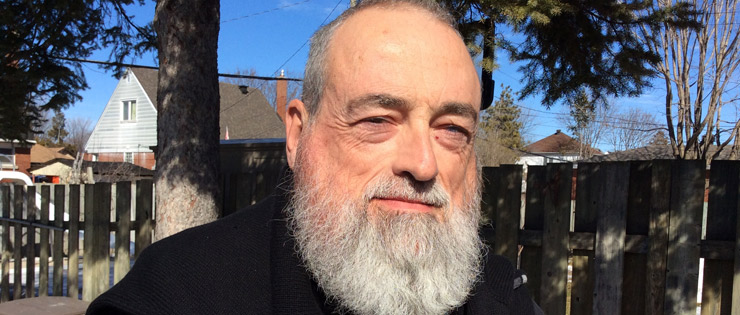Newsroom
Two lives forever changed by 30 years of HIV drug research
April 22, 2016

Yves Brunet has taken part in 15 HIV drug trials at The Ottawa Hospital since the 1980s. Thanks to research, daily treatments have commuted a sentence of certain death from AIDS into a manageable condition.
Yves Brunet and Andy Collins were diagnosed with HIV exactly 25 years apart. But thanks to rapid development of treatments, these Ottawa residents’ stories couldn’t be more different.
Public servant Yves Brunet had just started a new relationship in 1986 when he tested positive for HIV. In the coming years he attended funerals for many of his friends who died of AIDS, fully aware that he had what killed them.
“It meant that you’re likely going to die,” said Brunet. “It’s just a question of time.”
Retiring at age 34 because he was entering the AIDS stage of the disease, Brunet and his mother prepared for his eventual passing by studying palliative care. But death never came, thanks to his participation in 15 experimental HIV treatment trials at The Ottawa Hospital.
“Those clinical trials allowed me to stay alive, and every new drug that I took gave me enough time to get on to another one,” said Brunet. “I’m very grateful to The Ottawa Hospital to have allowed me to participate in all these studies, because that contributed greatly to saving my life.”
But the story is different for Andy Collins, who did not want his real name used because of the stigma that still surrounds HIV.
For Collins, diagnosed in 2011, HIV is a chronic condition that’s easily managed with a daily pill. Besides avoiding contact sports and trying his best not to get sick, the virus hasn’t really changed the 32-year-old fashion stylist’s lifestyle. In fact, most days he forgets about it.
“I’m still energetic. I’m still optimistic. I decided I wasn’t going to be defined by it,” said Collins.
Collins said his daily antiretroviral pills have zero side-effects, unless he forgets to take them with food. In that case the strong medication feels like heartburn or acid indigestion. He said his main problem is the stigma still associated with being HIV positive.
“I’d like people to realize that we all have an equal burden to bear. For some it might be an illness, a physical challenge or a mental health problem. I’d like the stigma of HIV to go away.”
Dr. Bill Cameron, Medical Director of Clinical Research and an HIV specialist at The Ottawa Hospital, is hopeful that even better treatments are coming. He played a large role in many of the drug trials in which Brunet volunteered, studies that developed and proved HIV therapies over 20 years.
“Today, we have a good handle on the medicinal treatment of HIV for those with lots of money or good health insurance, and some biomedical preventions that mostly work when they’re used. I believe we will eventually find good vaccines too,” said Dr. Cameron, also a professor at the University of Ottawa. “HIV is just another bug, and we’re going to squash it.”
About The Ottawa Hospital
The Ottawa Hospital is one of Canada’s largest learning and research hospitals with over 1,100 beds, approximately 12,000 staff and an annual budget of over $1.2 billion. Our focus on research and learning helps us develop new and innovative ways to treat patients and improve care. As a multi-campus hospital, affiliated with the University of Ottawa, we deliver specialized care to the Eastern Ontario region, but our techniques and research discoveries are adopted around the world. We engage the community at all levels to support our vision for better patient care.
About the University of Ottawa
The University of Ottawa is home to over 50,000 students, faculty and staff, who live, work and study in both French and English. Our campus is a crossroads of cultures and ideas, where bold minds come together to inspire game-changing ideas. We are one of Canada’s top 10 research universities—our professors and researchers explore new approaches to today’s challenges. One of a handful of Canadian universities ranked among the top 200 in the world, we attract exceptional thinkers and welcome diverse perspectives from across the globe. www.uottawa.ca
For further information, please contact
Amelia Buchanan
Senior Communication Specialist
Ottawa Hospital Research Institute
Office: 613-798-5555 x 73687
Cell: 613-297-8315
ambuchanan@ohri.ca
